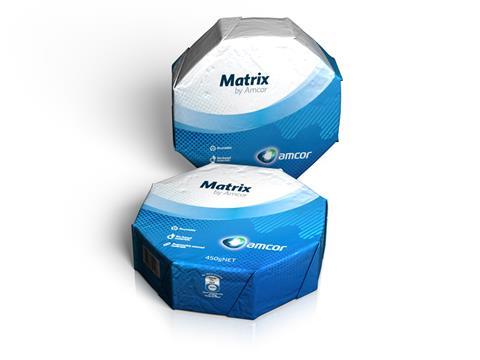
With the Sustainability Awards ceremony taking place tomorrow, we turn to Amcor to talk about their Matrix paper range, nominated in the 'Recyclable Packaging' category.
Could you please introduce your successful entry and what’s innovative about it?
Amcor’s Matrix range is a premium, paraffin-free and recyclable paper-based packaging.
Since the 1980s, soft cheese producers have used paper packaging with a paraffin layer. This provided some advantages: it is easy to produce and uses widely available materials. But it’s far from perfect. Paraffin easily transfers to the cheese product, potentially impairing taste, and it’s widely unrecyclable.
Amcor saw an opportunity to improve packaging options for soft cheese, and created Matrix, the industry’s first paper-based, paraffin-free and recyclable soft cheese wrap.
Paraffin-free packaging improves moisture exchange and ensures consistent taste throughout the product lifecycle. With Matrix soft cheese manufacturers are able to control in-pack ripening, significantly extend the shelf life and deliver the right taste to consumers. Longer time on the shelf can mean longer periods between re-stocks, cost reductions, less waste, and better sustainability credentials. And crucially, it answers consumer concerns about dairy products that expire and the subsequent food waste.
Furthermore, in cheese production facilities, Matrix minimizes cleaning time due to the absence of paraffin and helps reduce raw material costs.
What are the environmental challenges in packaging that your entry addresses, and what impact do you hope it will make?
Matrix provides the best solution for gourmet cheese maturation and provides a pragmatic solution to bring soft cheese packaging to the circular economy, thanks to its recyclability in the paper stream.
Here are the other sustainability benefits of Matrix:
1. Reduces cheese weight loss by up to 10%
2. Extends storage time up to 12 months, compared to six months with paraffin wraps
3. Reduces the packaging's carbon footprint by 38%
These benefits mean the Matrix cheese wrap range offers a more sustainable packaging option – environmentally and economically.
I’d like to ask you about the broader picture beyond your successful entry. ‘Sustainability’ in packaging is multi-dimensional – both in terms of objectives and challenges. Could you comment on the most important roadblocks you identify from your position in the value chain, and the kinds of solutions you would like to see addressing them (e.g. areas of technological innovation, collaboration, regulation)?
As a leader in packaging, Amcor has pledged to develop all its packaging to be recyclable or reusable by 2025. Together with our customers, we’ve identified key challenges to making packaging ready to recycle, and our R&D team is working on technical solutions that help us remove those challenges. Matrix is just one example of an innovation that will pave the way for other products’ packaging to be completely recyclable and recycled in the future. Another recent breakthrough was launching the first-ever recyclable retort pouches into the market with a pet food customer.
We’re also increasing our use of recycled materials and collaborating with customers, suppliers, NGOs, governments and others on infrastructure to collect, sort and recycle more packaging.
Through our partnerships with initiatives like CEFLEX and the Ellen MacArthur Foundation, Amcor is committed to sharing best practices so that our innovative products enter a marketplace that is equipped and ready to collect and recycle them.
















